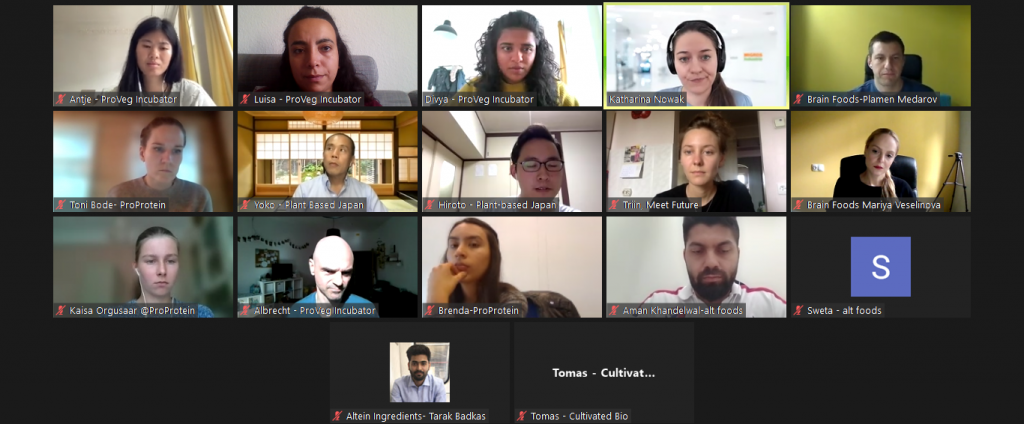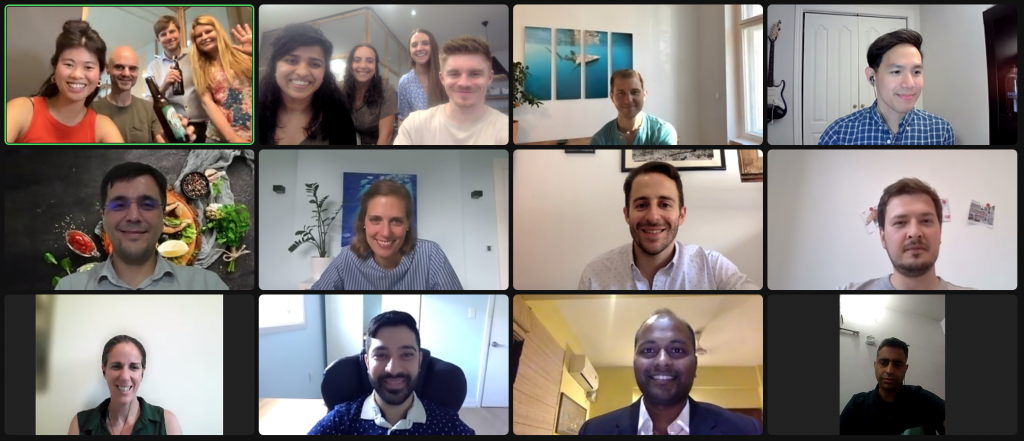We are, once again, accepting startup applications for our next cohort, which starts in September. However, have you ever wondered how exactly we work with the startups who take part in our accelerator programme? To start with: we hold different kinds of group sessions including workshops, fireside chats, and industry roundtables. Startups also host sessions, such as our Founder Fridays, where founders exchange knowledge within the community.
Last but not least, the 1-on-1 sessions with mentors and the Incubator team are a key element of the programme. If this is a lot to absorb, don’t worry, we take a deeper dive into each element of the ProVeg Incubator programme below:
Founder Fridays
Every two weeks, our startups gather together to discuss their OKRs (Objectives and Key Results), progress, and challenges – in order to find solutions as a group. These fortnightly sessions are a time for the founders to share their knowledge with one another. Whenever a startup has a particular area of expertise, specific skills, or just an interesting topic to discuss, they get their chance on Founder Fridays. In the last cohort, for example, Peter Nesaei from OceanTastes Inc. held a session on the science of cultured meat and existing patents. Founder Fridays are one of the key ways in which peer-to-peer connections are strengthened in the startup community.
Industry Roundtable
In these roundtable sessions, we invite guests from the food industry and retail sector to come and chat with the startups. The invited experts talk about what they are looking for in alternative-protein products. They also discuss the newest trends in their companies and what consumers are looking for. We have already hosted experts from Mondelez, Hochland, Rewe, and other leading companies. This is a real chance for startup founders – particularly those with consumer-oriented products – to connect with key players in retail and pitch their products. It is also a great opportunity for startups – since having access to people at retail and industry level can be a major hurdle for many companies in the early stages of their development.

Workshops
Through workshops, we address core areas of businesses (e.g. product development, marketing, B2B strategies). We invite experts from all over the world to conduct workshops with our alumni. After holding a presentation, the specialists offer a question-and-answer session with the startups, who can then explore their individual challenges and specific topics in depth. In the last cohort, for instance, we had Peter Dorfner and Dr Manon Sarah Littek, founders of the Green Generation Fund, hold a workshop on the fundamentals of branding. We also hosted Hannah Lester, CEO of AMGEN Regulatory Consulting, who clarified the main regulatory hurdles and barriers when it comes to alternative protein.
Fireside Chats
Fireside chats are also hosted by experts, including company founders and successful alumni. These friendly, free-form conversations are more casual and vary in their format. Sometimes they focus on specific, defined topics (e.g. positioning or scaling). Sometimes they are centred more around the founder’s experiences. We’ve hosted experts such as Ryan Bethencourt, founder and CEO of Wild Earth, who shared amazing insights on investments in the alt-protein arena as well as his top tips for building successful companies and finding the right investors. David Benzaquen, Founder and CEO of Mission Plant LLC and another of our fireside guests, spoke about positioning. During his session, he shared core points about positioning, provided examples, and asked valuable and thought-provoking questions about the topic. Ryan, along with David and Hannah (mentioned above) are part of the pool of more than 100 mentors at the ProVeg Incubator.
Mentor Matching and 1-on-1 sessions
Our team evaluates the specific needs and requests of each startup that joins us! We match each startup with one of the 100+ mentors in our pool who are experts in their respective fields. For example, in our last cohort, Fotortec needed support on fundraising and scaling B2B products, so we matched them with Frank Cordesmeyer, the Co-Founder and Managing Partner of Good Seed Ventures, who is also an expert investor who specialises in R&D and business development. The startups and the respective mentors work on their challenges and strategies together in 1-on-1 sessions. Often, the match is so accurate that these mentors work with the startups long after the programme is finished.
Plantcraft, for example, graduated from the Incubator programme in 2019 and still works with David Benzaquen, their lead mentor on the programme. Look at what Kati Ohens, Co-founder of Plantcraft has to say about the mentorship: “When the incubator matched us up with our lead mentor, it was so on point that, even years later, we still work with him. David Benzaquen is one of our most valued advisors.”
Check-ins and 1-on-1 sessions with Incubator members
Every startup that takes part in our cohort has an Incubator team member as their lead mentor and supporter throughout the programme and afterwards. They meet constantly in order to work on the deliverables (tasks that the startups need to accomplish every two weeks) and the current challenges facing each startup. Deliverables include a financial model, mission alignment, OKRs, and USPs (Unique Selling Proposition), as well as other key elements of a successful brand.

Demo Day
The Startup Demo Day traditionally marks the end of each edition of our accelerator programme. It’s a great opportunity for our founders, since this is the day they will finally pitch their brand or product to the Incubator team, mentors, investors, alumni, journalists, and food-industry stakeholders. The Startup Demo Day is hosted online. This is a big advantage in that the startups can present from all over the world. After a short welcome and introduction from the Incubator team, each startup is given their time to pitch. The pitch is followed by a Q&A with the investor panel. Since we can’t offer tastings, each company shares a product video in order to give the audience a sense of their creations.
To finish up, the audience and jury vote for their favourite startups. After that, moving on to some good old-fashioned networking sessions. The Demo Day is a unique and important opportunity for the startups to come face-to-face with top investors. In order to showcase their progress, and – hopefully – secure investment. Events such as Demo Day give startups the opportunity to start building and consolidating their network. Along with being in the spotlight for media coverage – which is always a plus. You can take a look at our last Demo Day here.

